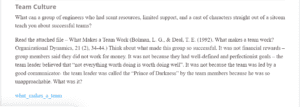Team Culture
Think about what made this group so successful.
The article “what makes a Team” elaborates on the highly successful team at the Eagle Group. People might be astonished that the group was not of a typical structure. When people hear about a successful team, the first thoughts that come into mind are that the team must be talented, its team leader must be motivating, or the incentives of accomplishing the goal are exciting. Surprisingly, among those attributes, none of them contributed to the success of the team.
Are you interested in obtaining a unique copy of the “Team Culture case study”? Get in touch with us.
The leader of the team was not only discouraging but also unmotivated. None of the members of the team was highly talented. Additionally, the team had no incentives, which would have given them a purpose of endeavouring highly towards. So it’s a wonder what made this team successful. The team’s great success resulted from the following: ritual and ceremony, humour, stories which reinforced the team identity, specific languages, illustrations instead of commands, diversity causing them to be competitive, and the process of adding the team members. On a personal level, among the characteristics, there is none which stands out to make the team very successful, do they? As a result of these unique characteristics, this team’s success is very striking to many. Based on the article, the team became very successful because of finding the team’s “soul” (Bolman & Deal, 1992).
Discuss how organizational culture made the Eagle Group successful. Be sure to apply the course material and use critical thinking skills and examples from the article to support your statements.
In a team’s success, organizational culture plays a crucial role. It is the strategy a team uses to get the work done. This system encompasses expectations and common standards. In the article, all the members were committed to the team despite having different capabilities and personalities. The team members were very diverse. The team also used unconventional methods, eventually leading to the team’s success. No member was left out of the team, they liked to use humour, and they all engaged in fun behaviour. As a result of their relationship, the team put their heart and soul into the project. As a result of this behaviour, they always made sure their work was done well. Every team member was expected to make sacrifices, such as putting everyone and everything second to the project. The team always held sporadic ceremonies to keep the team motivated by recognizing each person individually. The culture of the Eagle Group was resilient, which was the key to their behaviour and how they interacted with one another. Eventually, the Eagle Group culture led the team to success. Other teams and organizations need to learn from the Eagle group. A solid and diversified ethical culture was significant in the team’s accomplishments (Bolman & Deal, 1992).
How can you apply some elements that made the Eagle Group successful to your team in this course?
As a team, using and applying some of the Eagle Group elements can make our team successful. Though our team is virtual, we have been persuaded that having humour in the group will help remove tension. We have seen that laughter connects people and, more so, makes them feel comfortable. Humour can provide an insight into a person, a whole other side. Additionally, we can use a specific language. Communicate in our specific language in the team. There is a lot to learn from the Eagle group. Though unconventional, they have given us a whole new group experience to marvel at. In some years to come, we will attempt to use many of their techniques but also be careful not to inflict harm on our group.
Similar Post: The Impact of Financial and Strategic Planning
References
Bolman, L. G., & Deal, T. E. (1992, Autumn). What makes a team work? Organizational Dynamics, 21(2), 34+.
ORDER A PLAGIARISM-FREE PAPER HERE
We’ll write everything from scratch
Question
Team Culture
What can a group of engineers with scant resources, limited support, and a cast of characters from a sitcom teach you about successful teams?

Team Culture
Read the attached file – What Makes a Team Work (Bolman, L. G., & Deal, T. E. (1992). What makes a team work? OrganizOrganizationalcs, 21 (2), 34-44.) Think about what made this group so successful. It was not financial rewards – group members said they did not work for money. It was not because they had well-defined and perfectionist goals – the team leader believed that “not everything worth doing is worth doing well”. It was not because a good communicator led the team- the team leader was called the “Prince of Darkness” by the team members because he was so unapproachable. What was it?
Directions:
Discuss the following questions, and submit your answers in a written paper. Head each section of your paper to correspond to the numbers of each question (1, 2) below:
- Discuss how the organisation made the Eagle Group successful. Be sure to apply the course material and use critical thinking skills and examples from the article to support your statements.
- How can you apply some elements that made the Eagle Group successful if you were on a team in this course?
- Provide a title page.
Your content should include 600 words and use a double-spaced Times New Roman font.
You should include headings, topic sentences, and the inclusion of weekly learning.
Citations and references should be APA compliant.

